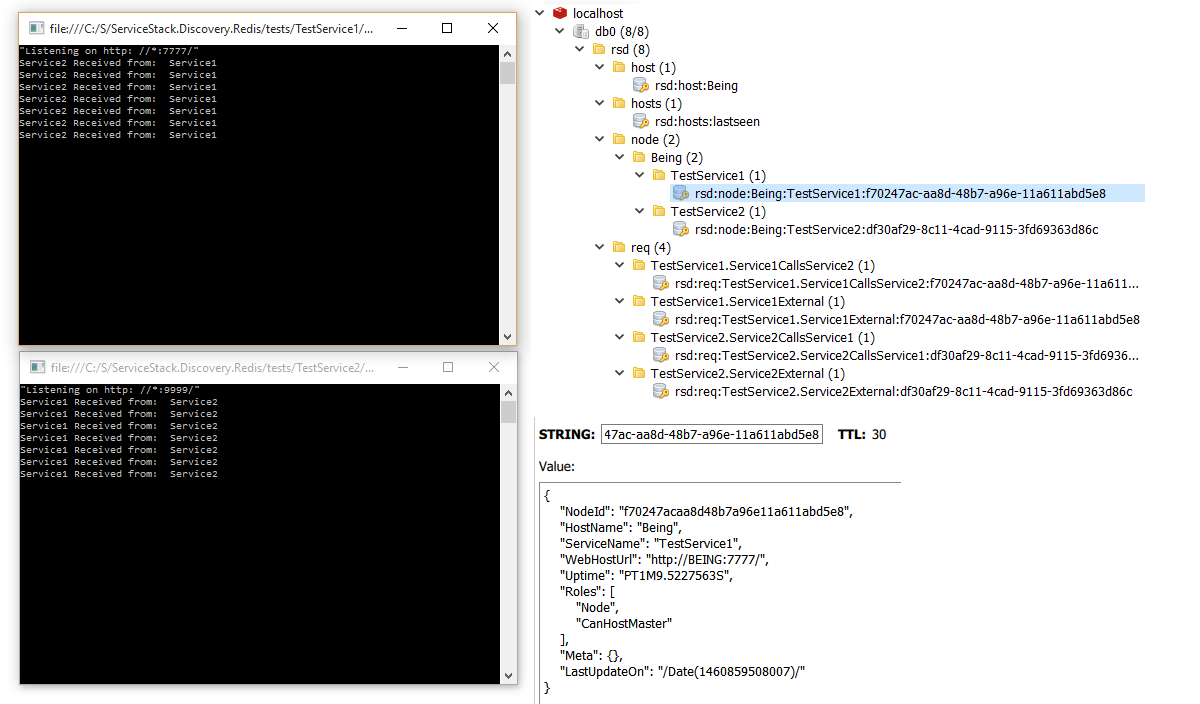DEPRECATED
These community plugins are no longer maintained however their code bases should still serve useful in different approaches for implementing a dynamic Service Discovery solution:
ServiceStack.Discovery.Consul
The ConsulFeature plugin by Scott Mackay leverages the hardened distributed Discovery Services and highly available features in consul.io to provide automatic registration and de-registration of ServiceStack Services on AppHost StartUp and Dispose that's available from:
<PackageReference Include="ServiceStack.Discovery.Consul" Version="8.*" />
Without any additional effort beyond registering the ConsulFeature plugin and starting a new ServiceStack
Instance it provides an auto-updating, self-maintaining and periodically checked registry of available Services:
public override void Configure(Container container)
{
SetConfig(new HostConfig {
WebHostUrl = "http://api.acme.com:1234", // Externally resolvable BaseUrl
});
Plugins.Add(new ConsulFeature()); // Register the plugin, that's it!
}

Once registered, the Service Gateway works as you'd expect where internal requests are executed in process and external requests queries the Consul registry to discover the appropriate and available Service to call:
public class MyService : Service
{
public void Any(RequestDTO dto)
{
// Gateway will automatically route external requests to correct service
var internalCall = Gateway.Send(new InternalDTO { ... });
var externalCall = Gateway.Send(new ExternalDTO { ... });
}
}

ServiceStack.Discovery.Redis
The RedisServiceDiscoveryFeature by Richard Safier has similar goals to provide transparent service discovery but only requires access to Redis-backed datastore, but is otherwise just as easy to install:
<PackageReference Include="ServiceStack.Discovery.Redis" Version="8.*" />
and Configure:
public override void Configure(Container container)
{
container.Register<IRedisClientsManager>(c => new RedisManagerPool(...));
SetConfig(new HostConfig {
WebHostUrl = "http://api.acme.com:1234"
});
Plugins.Add(new RedisServiceDiscoveryFeature());
}
Once registered, calling the same Gateway API's function the same way with internal requests executed internally and external requests sent to the appropriate available node:
public class MyService : Service
{
public void Any(RequestDTO dto)
{
var internalCall = Gateway.Send(new InternalDTO { ... });
var externalCall = Gateway.Send(new ExternalDTO { ... });
try
{
var unknown = Gateway.Send(new ExternalDTOWithNoActiveNodesOnline());
}
catch(RedisServiceDiscoveryGatewayException e)
{
// If a DTO type is not local or resolvable by Redis discovery process
// a RedisServiceDiscoveryGatewayException will be thrown
}
}
}
Since all Redis Discovery data is stored in a redis instance the state of all available nodes can be viewed with any Redis GUI:

ServiceStack.SimpleCloudControl
In addition to this Redis Discovery Service Richard is also developing a series of ServiceStack plugins that enhances the functionality of ServiceStack.Discovery.Redis and provides cluster awareness to additional aspects of a ServiceStack AppHost's internal state.